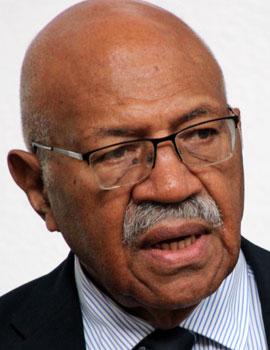Former Fiji Prime minister, Sitiveni Rabuka, says he wants next year’s election to be about common beliefs and not personalities.
Rabuka has emerged from what he describes as eight months in the political wilderness, to launch a new opposition party called the People’s Alliance.
It’s now going through the official registration process, but the former leader of SODELPA is confident approval will be granted, as the new group has the backing of more than double the five thousand names required to satisfy the regulations.
Looking ahead to the election next year, Rabuka has raised the possibility of a coalition being formed to replace the ruling Fiji First party, which he believes is at risk from its handling of the COVID-19 crisis, and the way he says it has threatened people who fail to get vaccinated.
However, Rabuka concedes if the People’s Alliance takes part in the election, there is a risk of splitting the opposition’s vote and strengthening Fiji First.
“We could be doing that.”
“That is a strategic decision that we have to make, and the option of drawing the line between two political personalities, rather than two political ideologies, because the opposition to government now share the same ideologies,” he told Pacific Beat.
“So what would happen is for us to find to find a new dialogue on coming together on a common platform and working together to unseat the government.”
But on the question of a future coalition, Rabuka says he does not know if such an arrangement would be workable with him involved, and that’s why he is forming his own new party.
“I was rejected by my former party as its party leader.”
“I have been in the wilderness since the seventh of December last year, and none of the other political parties that were already running, extended the olive branch to me.”
On the question of the COVID-19 crisis in Fiji, Rabuka expects it to loom large at the polls in 2022.
“I think the people all know that the situation has not been handled well. It could have been handled a lot better.”
“I proposed the idea of an apolitical combination…similar to the cabinet that was established by the British government during the early part of the Second World War, to bring both sides of a political divide together for a common platform.”
Rabuka acknowledges that vaccination rates in Fiji are high, but he questions the way the government has achieved those figures, and he says their methods could certainly influence the way people vote next year.
“People have been forced to have the vaccination…they could lose their social benefits, they could lose their jobs, when the government say no job, no work; no job, no re entry into the workforce; no job, no entry into public access areas,” the former prime minister said.
“People have been threatened in their personal choices because of the concern of the government for the well being of the economy,” he said.
SOURCE: ABC/PACNEWS














